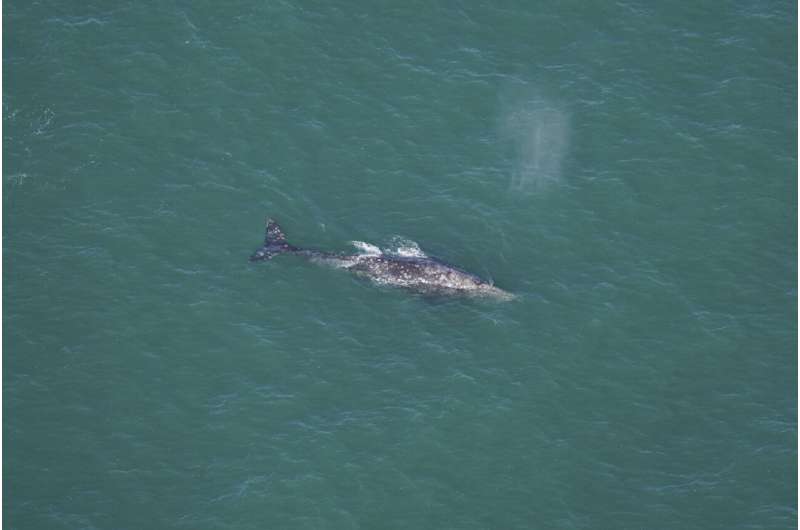This article has been reviewed according to Science X's editorial process and policies. Editors have highlighted the following attributes while ensuring the content's credibility:
fact-checked
reputable news agency
proofread
What is a whale native to the North Pacific doing off New England? Climate change could be the key

Scientists have confirmed the presence of a whale off New England that went extinct in the Atlantic Ocean two centuries ago—an exciting discovery, but one they said that illustrates the impact of climate change on sea life.
Researchers with the New England Aquarium in Boston found the gray whale while flying 30 miles south of Nantucket, Massachusetts, on March 1. The whale, which can weigh 60,000 pounds (27,215 kilograms), typically lives in the northern Pacific Ocean.
The gray whale vanished from the Atlantic Ocean by the 18th century, but there have been five observations of the animal in Atlantic and Mediterranean waters in the last 15 years, the aquarium said in a statement. The whale found this month was likely the same animal spotted in Florida late last year, the aquarium said.
The researchers who found the animal off Massachusetts said they were skeptical at first, but after circling the area for 45 minutes, they were able to take photographs that confirmed it was indeed a gray whale.
"I didn't want to say out loud what it was, because it seemed crazy," said Orla O'Brien, an associate research scientist with the Anderson Cabot Center for Ocean Life at the New England Aquarium.
Scientists said they were thrilled to see the animal, but its presence probably has to do with the warming of the planet. The Northwest Passage, which connects the Atlantic and Pacific oceans through the Arctic Ocean in Canada, has lacked ice in the summertime in recent years, they said.
That means gray whales are able to travel through the passage in the summer when normally they would have been blocked, the scientists said. O'Brien said the animal's arrival off New England serves "as a reminder of how quickly marine species respond to climate change, given the chance."
Gray whales were almost hunted to extinction during the era of commercial whaling. Today, the whales have recovered to the point that they are considered a species of "least concern" by the International Union for Conservation of Nature, though the organization considers the western population of the whales that lives off Asia to be endangered.
They can be identified by their lack of a dorsal fin and mottled appearance that makes them very different from whales more commonly seen off New England such as the humpback whale and minke whale. They also sound very different—while humpback whales are known for their haunting songs, gray whales make gurgles, grunts and croaks.
© 2024 The Associated Press. All rights reserved. This material may not be published, broadcast, rewritten or redistributed without permission.
















